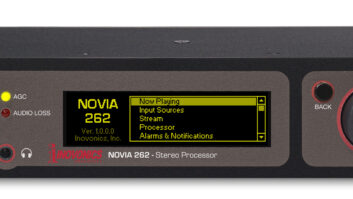Perhaps this small-market station’s mixing of news and personal habits wasn’t the best idea. Warning: If you’re just about to sit down to your morning breakfast burrito/bagel sandwich or maybe that noontime Whopper/Big Mac, you might want to go to another page and save this for later reading.

Years ago I attended a concert featuring a well-known female vocalist. Early in the performance, she attempted to get the crowd to warm up to her by confiding that as a little girl, she’d firmly believed that the queen didn’t have to pee. Now that she was all grown up, she admitted it was likely that even royalty had to relieve themselves from time to time.
Then she told us that before each live performance, she herself developed a nervous stomach and regurgitated her food — way too much information, even in this enlightened age.
The bottom line was that, no matter what her fans might think, both she and the royal family were only human. “The queen really pees, and I throw up.”
Well, broadcast people — boss jocks, engineers, you name ’em — are human, too. No matter what people listening to their radios might think, we have to make a trip to the “john” every once in a while too.
Drove my Chevy to the levee …
If you worked in the radio business before everything was canned or satellite-delivered from some remote studio located God-knows-where, you may remember the term “bathroom record.”
No, this was not some kind of recognition for the person who stayed on the throne the longest. Bathroom records were the lengthy recordings you cued up when you felt the need to head for the sandbox and didn’t want to risk hearing the hall monitor going “whsk, whsk, whsk” before you finished your business. (If this did happen, the beehive light over the phone usually was flashing when you got back to the control room, with the PD or manager on the other end.)
One of my favorite bathroom songs was Richard Harris’ “MacArthur Park.” It ran for a full 7 minutes 21 seconds, more than twice the length of the average record, giving you plenty of time to do what you had to do. (The song was so long that some stations created an edited version to fit their formats.)
Another great one was Don McLean’s “American Pie” at 8:36. The Beatles had several hits that played well for their friends in need: “Yellow Submarine” at 6:38, “Hey Jude” at 7:11 and “Revolution,” which clocked in at 8:22, a great bathroom record.
“Nights in White Satin” by the Moody Blues was a good one to track if you had to leave the control room. As I recall, the album version ran well over 7 minutes.
Others from that general period — though not quite so long — were Bobbie Gentry’s “Ode to Billie Joe” (4:15), Procol Harum’s “A Whiter Shade of Pale” (4:05) and Frank Sinatra’s “It Was a Very Good Year” (4:25). We could drop in “oldies,” but the PD dared anyone to track an album — ever!
I mentioned to a younger buddy that I was trying to put together a list of bathroom records and he offered up “November Rain” by Guns ’N Roses, at 8:57, but that was in the ’90s and I was long out of jocking by then.
I suppose that the all-time best bathroom song back in the swinging ’60s was Iron Butterfly’s “In-A-Gadda-Da-Vida,” which ran well over 17 minutes. Of course, if I had put that on the turntable, I’d have been fired.
I’m sure we all have our own stories about trips to the john in various broadcast facilities. Now that I’m approaching the autumn of a rather mediocre career, at least a couple stand out among my memories.
No after-hours tours, please!
I was doing a gig at a top-40 station in a building that had been built back in the “golden days” of radio. It had big studios where actors and sound effects people could play to “the theatre of the mind” or where a 40-piece orchestra could spread out and play live music. Everything in the building was connected by a very long “L”-shaped hallway that wrapped around the studios, which were by that time mostly unused.
The lobby was at the top of the “L” and the elevated control room, designed to overlook the studios, was at the other end of the “L.” You can guess where the bathrooms were: yep, in the lobby area, about as far away from the CR as you could get. Even with a brisk walk it took over a minute to get from board to potty.
I worked a long evening shift (5 p.m. until signoff, at 1:30 a.m. or later) and even though I didn’t want to be that far from the turntables, I usually needed to take at least one walk per shift.
My solitary bathroom break usually came a couple of hours into my shift. Because I was the only one there, I’d leave the john door open to hasten my return to the CR. This also made it easier to hear the lobby speaker in case a record got stuck.
“MacArthur Park” was riding high in the charts and had become my bathroom song of choice. One evening about 9 p.m., I had done my business and was getting ready to pull up trou and head back to the control room. Richard Harris was crooning about the cake left out in the rain and the sweet green icing flowing down and I thought all was well.
Then I heard the front door open, and before I could rearrange my clothes, the formerly dark lobby was ablaze in light and several people of both sexes were entering. There was the sales manager, his wife and two other couples — probably big advertisers. The sales manager was slurring his words but saying something about going to the control room and meeting the “boss jock.”
By then all eyes were riveted on me. There I was, in a most awkward position, with a hand full of TP. All I could do was kick the door closed and hope they’d be elsewhere when I had to dash back down the hall before the record ended.
Thankfully, I heard the manager say something about how maybe this tour hadn’t been such a good idea and how he’d have to speak to the janitorial service about their indiscreet cleaning crew.
Toilet paper/Teletype paper
The physical location of another john sticks in my mind. The little AM station I worked for was in an old house out near the edge of town. It was a shoestring operation, with physical space at a premium. This little house had not been designed to accommodate a transmitter, studio, control room and various offices.
To keep the noise from the AP Teletype from reaching the control room, the station had faced a choice between putting the banging, clanging machine outside the manager’s office or in the solitary one-holer bathroom. Despite protests from several of us who had to rip and read the news, the john location won out.
Now this really wouldn’t have all that bad except for one overweight salesman named “Fred,” who several times a day, delighted in heading to the john with a pack of Camels and the funnies, or maybe the latest copy of Broadcasting.
Of course, when it came time to pull the latest set of headlines or five-minute summary off the Teletype, you can guess where Fred was.
You basically had two choices: Knock on the bathroom door and ask Fred to rip off the last 10 feet of fanfold and shove it under door (he was not known for washing his hands), or just go back to the CR and read the last news summary that happened to be there.
Unbeknownst to everyone, Fred at one point removed the bell from the machine because the noise bothered him. It was only after we missed the news about the JFK assassination by nearly two hours that the manager relented and put the AP machine out in plain view in the hallway. He eventually got used to the noise.
A most unusual men’s room
I’ll leave you with just one more radio station bathroom story, one that didn’t happen to me but to a chief engineer buddy.
Seems that the day after the station’s Christmas party, a lot of staff called in sick. You guessed it; stomach virus — probably from something the trade-out restaurant had served the night before.
Over the next couple days, even those who’d missed the party were laid low. Of course the “show had to go on,” and it’s always the engineer who has to hang in there and keep it running. (Management told us it’s ’cause we made the really big bucks.)
Anyway, as sick as Charlie was, he dragged himself in and segged spots, jingles and records. (The big boss told him not to try and talk. Ratings were bad enough as it was.)
This was one long-running bug, no pun intended; but Charlie stayed on the job. I think they promised him a trip to Mexico for his dedication. By the time things finally returned to normal, Charlie had done some engineering work that set that station apart from everyone else in the market or, for that matter, any other radio station in the country. Or maybe I’m wrong. Does anyone know of any other station equipped with turntables and cart machines that could be remote started from the men’s room toilet stall?
Hello, Guinness World Records people!
Joe E. Lasmane is a retired broadcast engineer and one-time “boss jock” who spent the better part of his career during broadcasting’s “Golden Age” (no computers, microprocessors or digital audio). In a previous story he examined the lighter side of hazmat.












